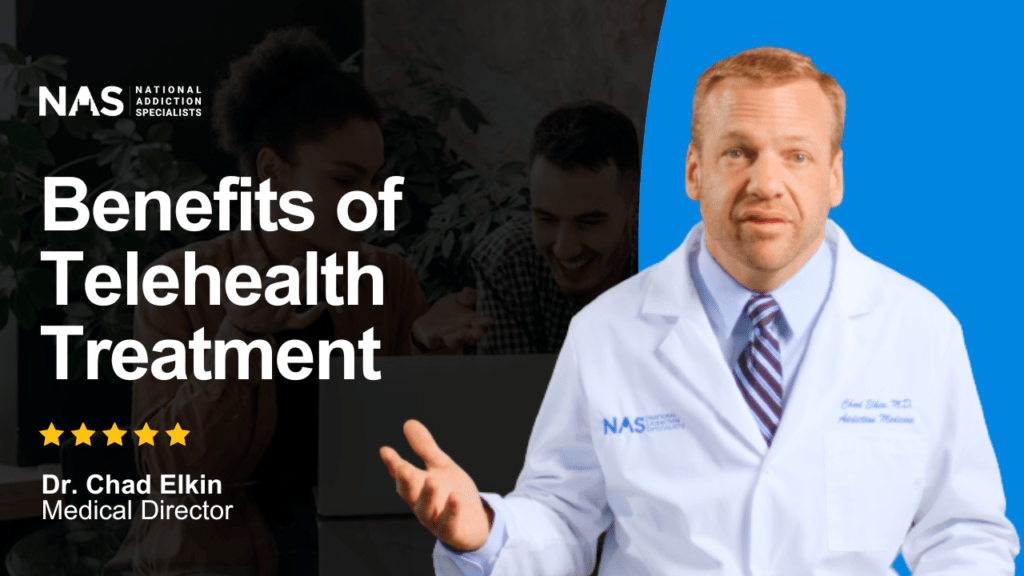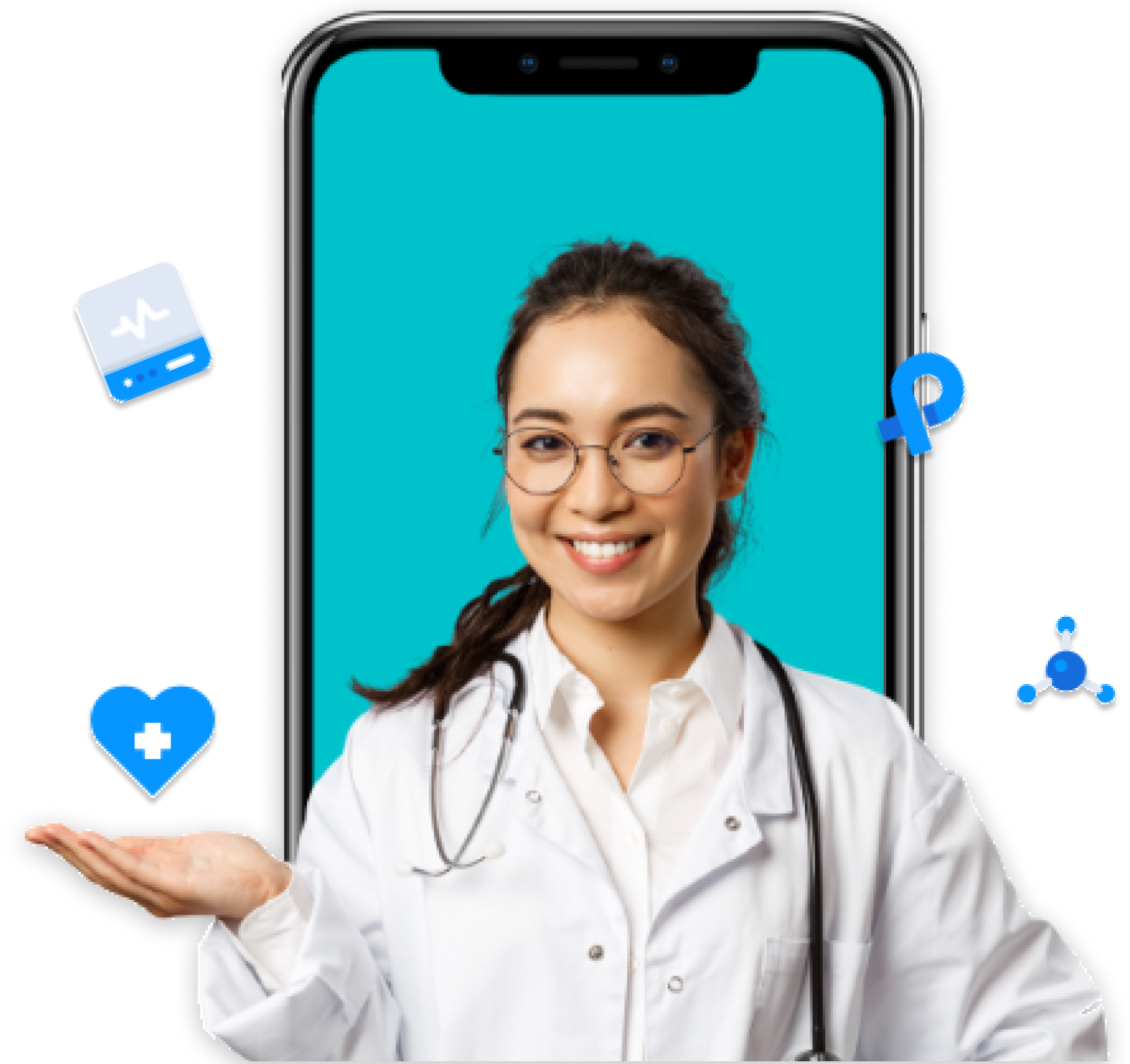Why Free Suboxone Treatment Can Save Lives
Free suboxone treatment is available through multiple pathways, even without insurance. Here are your fastest options:
- Medicaid coverage – Covers most or all costs in expansion states.
- Manufacturer savings cards – Can reduce costs significantly.
- Emergency departments – Can provide up to 3 days of treatment immediately.
- Community health centers – Often offer sliding-scale or free services.
- State assistance programs – May cover full treatment costs.
The opioid crisis affects millions of Americans, with over 130 overdose deaths occurring daily. Yet, most people with opioid use disorder don’t receive life-saving medications like buprenorphine (the active ingredient in Suboxone). Research shows buprenorphine treatment reduces all-cause mortality by 37%, as it eases withdrawal and cravings while blocking other opioids.
Thanks to expanded telehealth options, getting help is more accessible than ever. I’m Dr. Chad Elkin, founder of National Addiction Specialists. My goal is to help you overcome barriers and connect you with the resources you need to start recovery today.
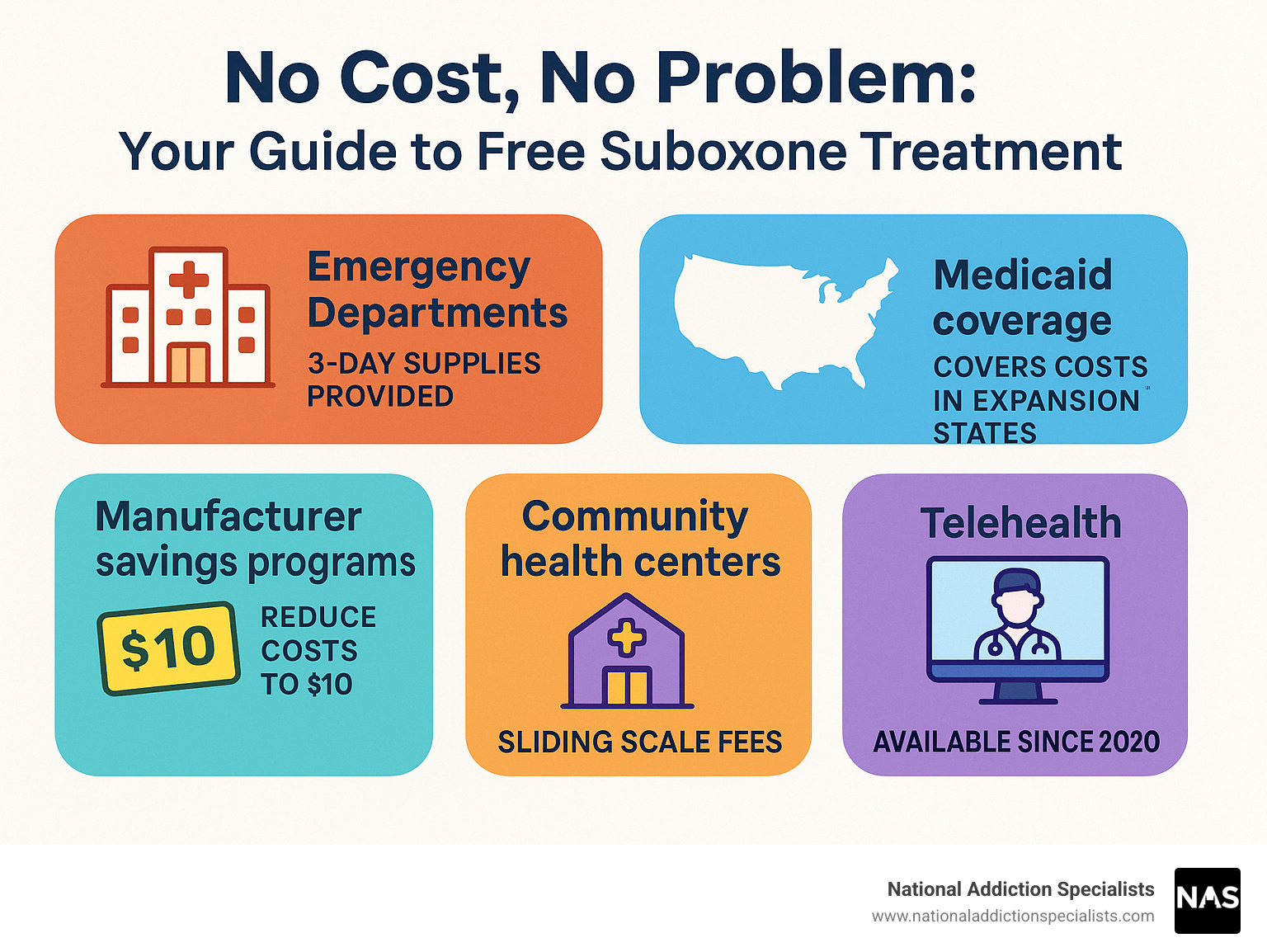
Free suboxone treatment terms at a glance:
What You’ll Learn
This guide provides a roadmap to accessing free suboxone treatment. We’ll cover the science behind Suboxone and provide actionable steps for navigating insurance, finding free care through clinics and telehealth, and starting your journey to recovery with confidence.
The Opioid Crisis & Why Access Matters
Every day in America, 130 people die from an opioid overdose. This is a national crisis, with about 2 million Americans living with opioid use disorder. Heartbreakingly, only 20% to 40% receive the medications that could save their lives. This treatment gap means millions who could benefit from free suboxone treatment are going without it.
This gap exists for several reasons. Stigma makes people afraid to seek help, and many don’t realize addiction is a treatable medical disease. High costs and complex insurance rules create significant financial barriers. Until recently, strict regulations also limited the number of doctors who could prescribe these medications. Removing these barriers is crucial to saving lives.
Science Behind Medication-Assisted Treatment
Buprenorphine, the active ingredient in Suboxone, is a partial opioid agonist. It fits into the same receptors in the brain as other opioids but only activates them partially.
This unique action achieves three things: it reduces withdrawal symptoms, lessens cravings, and blocks the effects of other opioids. This combination helps stabilize the brain and allows individuals to focus on recovery.
The evidence is clear: a landmark study found that people taking buprenorphine had a 37% lower risk of death from any cause compared to those not receiving treatment. This scientific research on buprenorphine outcomes proves that this medication is essential for saving lives. No one should be denied access due to cost, which is why we are passionate about making free suboxone treatment a reality for all.
Insurance, Pricing, and Barriers to Suboxone Care
Navigating insurance for Suboxone can be confusing, but understanding the system is the first step to overcoming barriers. While most commercial plans cover Suboxone, details like deductibles, copays, and prior authorization can create unexpected costs.
Medicaid expansion has been a game-changer. In the 40+ states that expanded Medicaid, you may qualify for comprehensive coverage, often making it your most direct path to free suboxone treatment. The Mental Health Parity and Addiction Equity Act (MHPAEA) also mandates that insurers cover addiction treatment like any other medical condition, though compliance can vary.
In a major step forward, the DEA waiver requirement for prescribing buprenorphine was eliminated in January 2023. Now, any licensed physician can prescribe it, which is steadily increasing the number of available providers. Additionally, always ask your provider about generic buprenorphine/naloxone. It’s medically identical to brand-name Suboxone but costs significantly less, which can dramatically reduce your out-of-pocket expenses.
How Prior Authorization Works & How to Avoid Delays
Prior authorization is a process where your doctor must get pre-approval from your insurance company. This can cause frustrating delays when you need medication urgently.
To speed things up, work closely with your provider’s office. Ensure they understand the urgency and have submitted all necessary paperwork. Follow up politely but persistently with both your doctor’s office and your insurer. Many insurance companies have dedicated hotlines for substance use benefits that can help expedite requests. If a request is denied, you have the right to appeal. A peer-to-peer review between your doctor and an insurance physician can often resolve the issue.
Free Suboxone Treatment Options
Free suboxone treatment is possible through more pathways than ever before. Expanded funding and innovative programs are breaking down cost barriers for those in need.
- Community Clinics and FQHCs: These federally funded centers offer sliding-scale fees based on income. For those with limited or no income, this often means completely free suboxone treatment and comprehensive support services.
- Telehealth Services: The pandemic normalized virtual care, making treatment accessible from home. Many telehealth providers, including National Addiction Specialists, accept Medicaid or offer programs that make care free or low-cost, removing geographical and privacy barriers.
- Manufacturer Savings Programs: Pharmaceutical companies offer patient assistance programs that can be very generous. Copay cards can reduce prescription costs to as little as $10, while other programs provide free medication to uninsured individuals who qualify.
- State Assistance Programs: Many states have dedicated funds for substance use disorder treatment. Check with your state’s health department to see what programs are available to cover medication and counseling.
- Discount Services: Even if you don’t qualify for free care, services like GoodRx can make generic buprenorphine affordable, often reducing monthly costs from hundreds of dollars to under $50.
Emergency Departments & Bridge Clinics Offering Free Suboxone Treatment
If you are in crisis or experiencing severe withdrawal, your local emergency department (ED) can be a lifeline. Under federal regulations, emergency physicians can provide up to three days of Suboxone treatment to stabilize you. This is not a long-term solution, but it provides immediate relief and is often covered as emergency care.
Many hospitals now have bridge programs that provide this immediate treatment and then facilitate a “warm handoff” to an outpatient clinic, often scheduling your first appointment before you leave the hospital. This approach, detailed in Scientific research on ED induction, dramatically increases the chances that people will engage in long-term recovery. Seeking help at an ED is a critical step toward recovery when you need it most.
Step-by-Step Guide: From First Call to First Dose
Starting your recovery journey can feel overwhelming, but it can be broken down into manageable steps. Many people find free suboxone treatment options along the way.
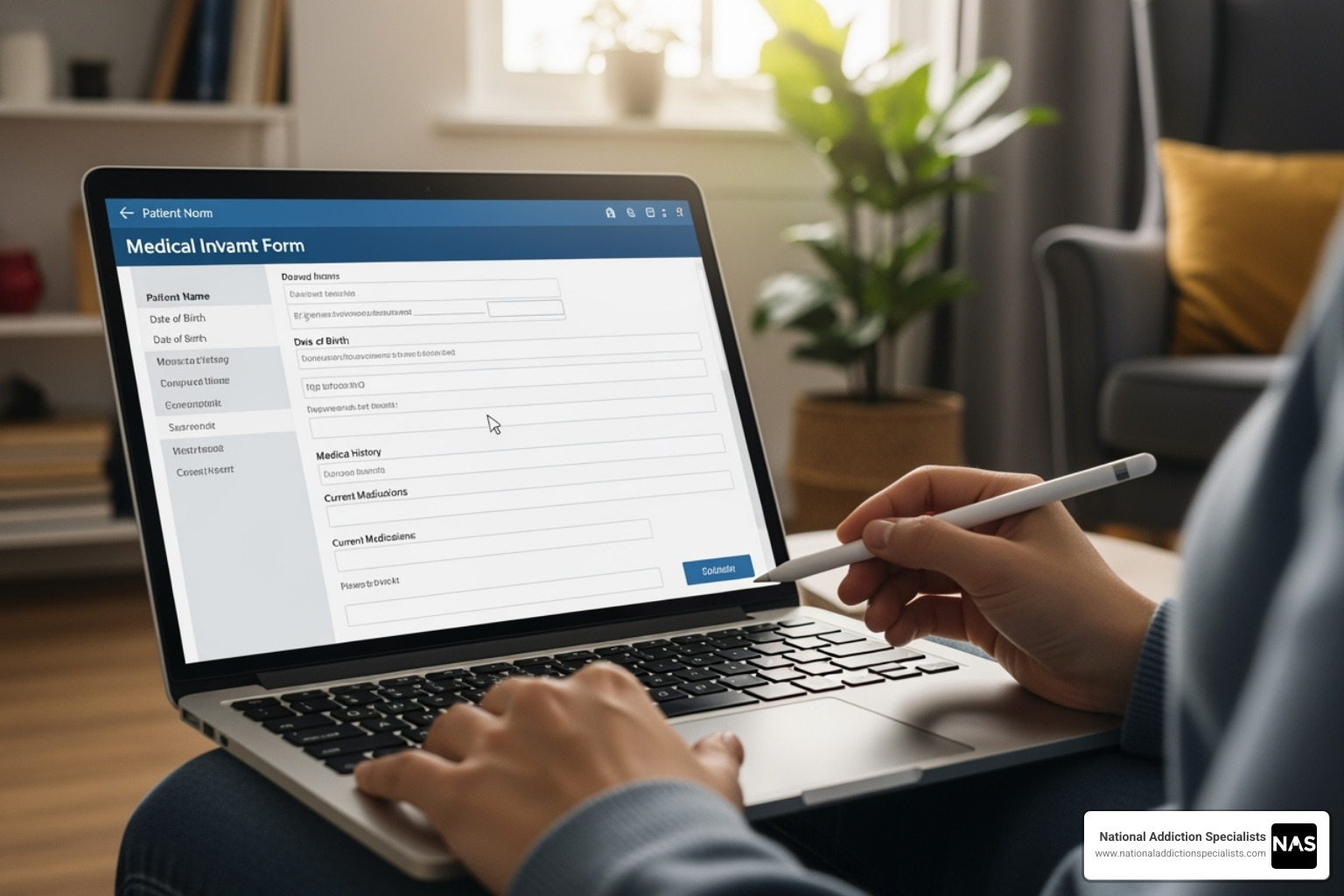
- Call the SAMHSA National Helpline: Start by calling 1-800-662-HELP (4357). This free, 24/7 confidential service can connect you with local treatment providers, including those offering free care, and explain your insurance options.
- Find a Provider: Use SAMHSA’s online Buprenorphine Practitioner Locator to find qualified doctors and clinics. You can filter by payment options to find providers who accept Medicaid or offer sliding-scale fees.
- Consider Telemedicine: Telehealth providers offer treatment from home. The process usually involves a phone screening followed by a video consultation with a licensed provider who can send your prescription to a local pharmacy. This is a convenient and private way to access care.
- Prepare Your Documents: For your appointment, have your photo ID, proof of address, and insurance card (if any) ready. Be honest with your provider about your opioid use history so they can determine the right dose for you. For more details, see our guide on Suboxone treatment services.
Home Induction Tips for Free Suboxone Treatment Success
Home induction, or taking your first dose at home, is a common practice with telemedicine. Success depends on following your provider’s instructions exactly.
- Withdrawal Timing: You must be in moderate withdrawal before your first dose (usually 12-24 hours after last use of short-acting opioids). Taking it too soon can cause precipitated withdrawal, a sudden worsening of symptoms.
- Safety Monitoring: Your provider will check in with you frequently during the first few days. Start with the exact dose prescribed and have someone nearby. Ensure naloxone (Narcan) is available as a safety precaution.
Long-Term Support at No Cost
Medication is just the first step. Long-term recovery is strengthened by additional support, much of which is free.
- Peer Recovery Coaches: These are individuals with lived experience who can provide one-on-one support. Many states fund peer support programs.
- Online Support Groups: Groups like Narcotics Anonymous or SMART Recovery offer free meetings via video chat at all hours.
- State-Funded Counseling: Many community mental health centers offer free individual and group therapy for substance use disorders. Contact your state’s health department to find programs near you.
Urgent & Short-Term Solutions When You Run Out
Running low on Suboxone can be terrifying, but there are solutions to bridge the gap until your next appointment. Your first step should be to call your provider’s office as soon as you realize you might run short. They can often call in a bridge script (a 3-5 day supply) to your pharmacy.
Your pharmacist can also be an ally, helping to expedite refill requests with your doctor. While urgent care centers are a mixed bag for Suboxone prescriptions, it’s worth calling to ask. For immediate emotional support and resource guidance, harm-reduction hotlines can provide crisis counseling and help you create a safety plan.
Getting Emergency Suboxone Without a Prescription
You can legally receive Suboxone at an emergency department without a prescription from your regular doctor. The DEA 3-day rule allows emergency physicians to administer buprenorphine for up to 72 hours to treat acute opioid withdrawal. If you are in severe withdrawal, going to an ER can provide immediate, life-saving relief. This care is often covered by insurance or emergency Medicaid, making it a form of free suboxone treatment in a crisis. Many hospitals will also help connect you to ongoing care.
Whenever you receive opioid-related treatment, ask for naloxone co-dispensing. Naloxone (Narcan) reverses an overdose and is available without a prescription at most pharmacies.
Alternatives if Suboxone Is Unavailable
If Suboxone isn’t an option, effective alternatives exist.
- Methadone Clinics: Methadone is another form of medication-assisted treatment. It requires daily visits at first but is often covered by Medicaid and provides a structured, supportive environment.
- Naltrexone: This medication blocks opioid receptors, preventing relapse. It comes as a daily pill or a monthly injection (Vivitrol) and requires you to be fully detoxed before starting.
- Harm-Reduction Kit: Regardless of your treatment path, a harm-reduction kit is essential. It should include naloxone, fentanyl test strips, and other tools to keep you safe.
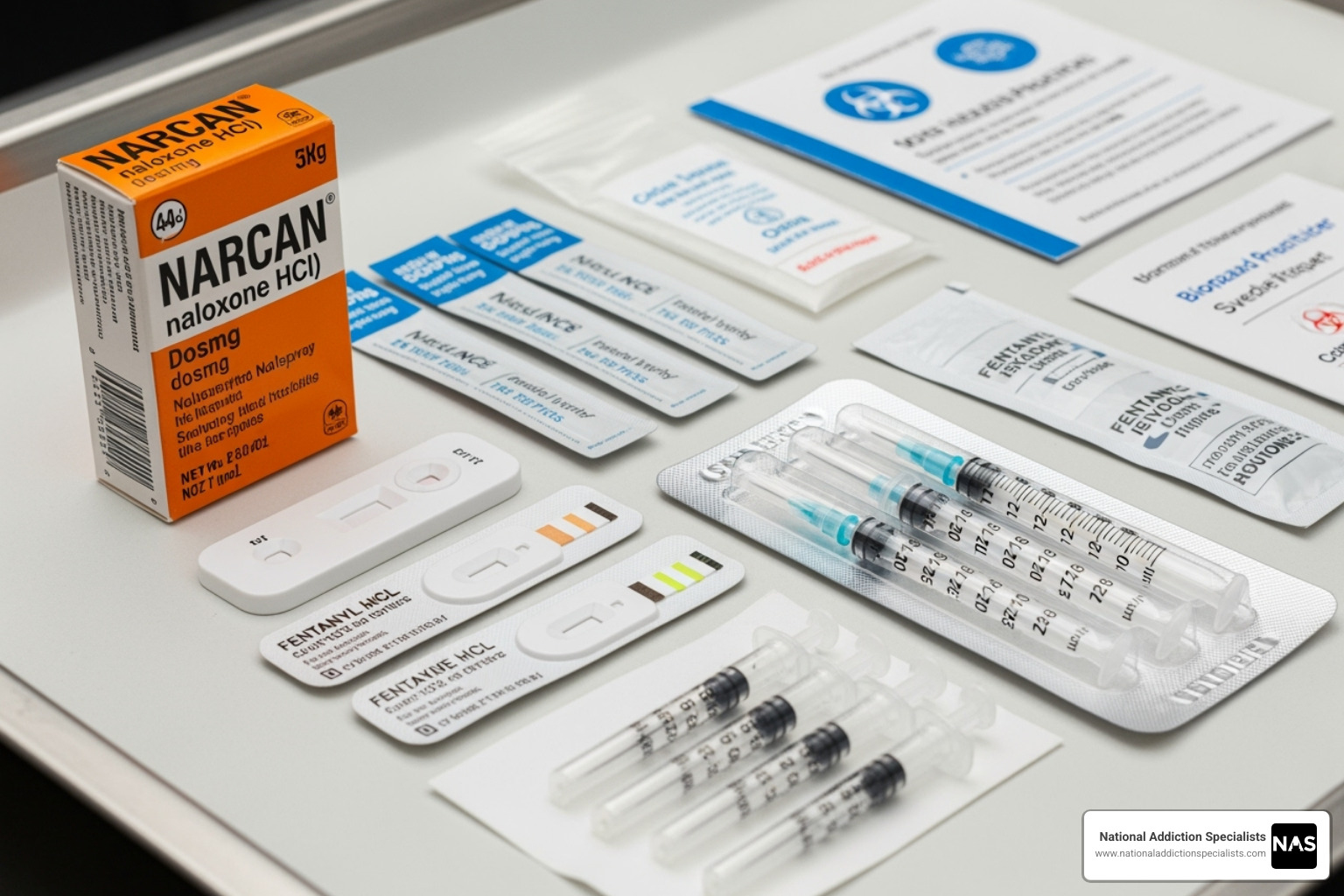
Frequently Asked Questions about Free Suboxone Treatment
It’s normal to have questions when starting your recovery journey. Here are answers to the three most common concerns we hear about free suboxone treatment.
Is free Suboxone really safe and legal?
Yes, absolutely. When you get free suboxone treatment through legitimate channels like a licensed doctor, community clinic, or Medicaid, you are receiving the exact same FDA-approved medication and quality medical supervision as someone paying full price. The “free” part simply refers to the funding source—whether it’s a government grant, an insurance program, or a manufacturer’s assistance program. Your safety is ensured by the qualified medical professional guiding your care.
Can I get free Suboxone treatment online?
Yes. This is one of the most significant advances in addiction care. Many telemedicine providers, including National Addiction Specialists, accept Medicaid, which can make your treatment effectively free. Online care offers the same quality medical oversight from a licensed provider but with the added privacy and convenience of being at home. This is especially helpful if you live in a rural area or have transportation challenges.
How fast can I start if I’m in withdrawal?
Much faster than you might think. If you are in acute withdrawal, your quickest option is an emergency department. Under federal rules, an ED physician can give you up to a 3-day supply of Suboxone to provide immediate relief. With telemedicine providers, you can often get a consultation within 24-48 hours, with some offering same-day appointments for urgent cases. Don’t wait and suffer—help is available now.
Conclusion
Recovery from opioid use disorder is an achievable reality. As we’ve shown, free suboxone treatment is accessible through multiple pathways, including Medicaid, manufacturer programs, community clinics, and telehealth services. The barriers that once seemed impossible are now easier to steer with the right information.
Key changes, like the removal of the DEA waiver and the rise of telehealth, have transformed the treatment landscape. You no longer need to worry about transportation or privacy issues to get help. With providers like National Addiction Specialists, you can receive expert care from licensed physicians in Tennessee and Virginia from the comfort of your home. We accept both Medicaid and Medicare because we believe cost should never be a barrier to life-saving treatment.
Seeking free suboxone treatment is about accessing the same evidence-based care that has helped millions reclaim their lives. Your journey is unique, but you don’t have to walk it alone. A network of support is waiting for you.
Make an Appointment to Treat Addiction
Please don’t hesitate. Make an appointment today.
https://www.nationaladdictionspecialists.com/new-patient-packet/
This article was medically reviewed by:
Chad Elkin, MD, DFASAM is a board-certified addiction medicine physician, founder, and Chief Medical Officer of National Addiction Specialists, dedicated to treating substance use disorders. A Distinguished Fellow of the American Society of Addiction Medicine (ASAM), Dr Elkin currently serves as President of the Tennessee Society of Addiction Medicine (TNSAM) and has held various leadership roles within the organization. Dr Elkin chairs ASAM’s Health Technology Subcommittee and is an active member of its Practice Management and Regulatory Affairs Committee, State Advocacy and Legislative Affairs Committee, and other committees. He also serves on the planning committee for the Vanderbilt Mid-South Addiction Conference. Committed to advancing evidence-based policy, Dr Elkin is Chairman of the Tennessee Association of Alcohol, Drug, & Other Addiction Services (TAADAS) Addiction Medicine Council, which collaborates with the TN Department of Mental Health & Substance Abuse Services (TDMHSAS). He has contributed to numerous local, state, and national task forces, helping develop professional guidelines, policies, and laws that align with best practices in addiction medicine. His work focuses on reducing addiction-related harm, combating stigma, and ensuring access to effective treatment.Passionate about the field of addiction medicine, he remains dedicated to shaping policy and enhancing patient care.
Suboxone® and Subutex® are a registered trademark of Indivior UK Limited. Any mention and reference of Suboxone® and Subutex® in this website is for informational purposes only and is not an endorsement or sponsorship by Indivior UK Limited.



